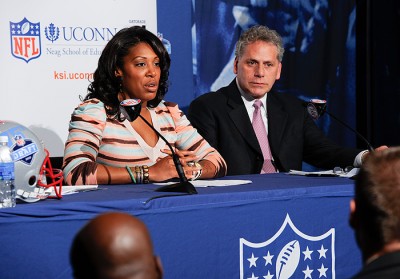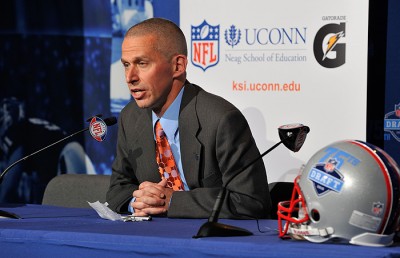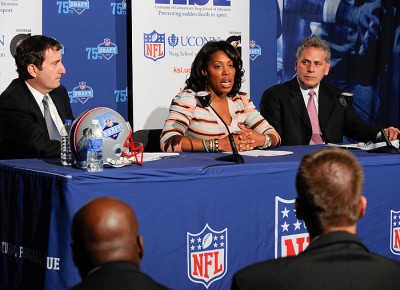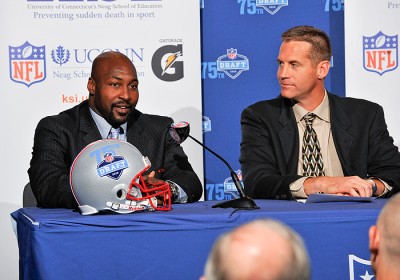
When Kelci Stringer was looking for a home for a research institute honoring her late husband – All-Pro NFL lineman Korey Stringer – the University of Connecticut and its renowned kinesiology department were her first choice.
Korey Stringer died from complications due to an exertional heat stroke he suffered during a Minnesota Vikings pre-season training camp in 2001. At the time, the University’s Department of Kinesiology with its highly touted Human Performance Laboratory was gaining a national reputation as a leader in studying heat-related illnesses and hydration in athletes.
After speaking to UConn kinesiology professor Douglas J. Casa and calling on him as an expert witness in litigation she filed following her husband’s death, Stringer was convinced she had found the person to lead the institute. Kelci Stringer announced her decision to establish the Korey Stringer Institute at UConn in late April at the 2010 NFL Draft.
“(Doug Casa) is clearly one of the most passionate people I have ever met in my life,” Stringer said. “With his background at the University of Connecticut’s Department of Kinesiology and their reputation as a national leader in the study of heat and hydration in sports, it was practically divine intervention that I decided to work with them. They have been relentless in their efforts to help me and their commitment is unsurpassed.”

Casa will serve as the Korey Stringer Institute’s chief operating officer, and is chairman of its medical & science advisory board. A survivor of heat stroke who has dedicated his career to raising awareness and preventing heat-related illnesses in other athletes, Casa has published more than 100 peer-reviewed studies and presented more than 300 times on subjects related to heat stroke, heat-related illnesses, hydration, and preventing sudden death in sport. A fellow of the National Athletic Trainers’ Association and the American College of Sports Medicine, Casa has successfully treated more than 100 cases of exertional heat stroke.
“Our goal with the Korey Stringer Institute is the eradication of death from heat stroke within organized sport in America,” Casa says with his trademark high-energy, rapid-fire delivery. “I’m not saying we will actually ever achieve it because there are things outside our control, but that is our goal every single day when we walk into the office.”
The Korey Stringer Institute was established with the support of the National Football League and Gatorade as founding partners. The NFL Players Association is also an active supporter. Part of the Institute’s mission will be to advise high schools across the country on setting up emergency action plans in case athletes succumb to heat-related illnesses on the playing field. Casa said the Institute’s website will provide up-to-date information for coaches, parents, athletes, and medical staff. The research team will also advocate for policy changes to improve athlete safety around the country.

“The NCAA implemented guidelines six years ago in terms of phasing in practices for athletes and they have been phenomenally successful in preventing deaths during the August ‘two-a-days’,” Casa says. “But only about half the states in America have policies for high school football. There are states where you can do three, three-hour practices on the first day of football in full gear in 100-degree heat. Obviously, that is not looking out for the health and safety of those athletes.”
Casa has a talented team of advisors and graduate students working with him. The team includes kinesiology department head Carl Maresh, a national authority on exercise in stressful environments, and Professor Lawrence Armstrong, a widely respected research scientist in the field of heat exhaustion, heat stress, and hydration as it pertains to extremely active individuals such as athletes, laborers, and military personnel.
The research team uses state-of-the-art equipment to conduct its studies. Since its inception, the kinesiology department’s Human Performance Laboratory has grown from a 250-square-foot lab with a treadmill and centrifuge in the basement of Koons Hall to an 8,000-square-foot facility in Gampel Pavilion with several million dollars of equipment, including an environment-controlled exercise chamber, a complete biochemistry lab, and an array of high-tech devices for monitoring physiological stress in the human body.

With those kinds of resources available at UConn, representatives of the NFL and Gatorade agreed with Kelci Stringer that UConn was the proper home for the institute she envisioned to further research and prevent heat-related tragedies from happening to other athletes in the future.
“This is a group of people who are going to get it done … in a first-class way,” says Gary M. Gertzog, senior vice-president of business affairs for the NFL. “[They] align themselves with people who are top-shelf and they have done that with the University of Connecticut.”
Scott Paddock, director of sports marketing for Gatorade, says the Gatorade Sports Science Institute will be an active partner with UConn in conducting research to help keep athletes safe.
“We are proud to bring our research and scientific support to Doug and his colleagues at the University of Connecticut,” Paddock says. “Doug and his team represent the best of the best. We’ve been privileged to work with Doug. I’ve known Doug for many years and I know the passion and commitment he has for this endeavor.”
This article originally appeared in the April 29, 2010 edition of UConn Today
 Facebook
Facebook
 Twitter
Twitter
 LinkedIn
LinkedIn
